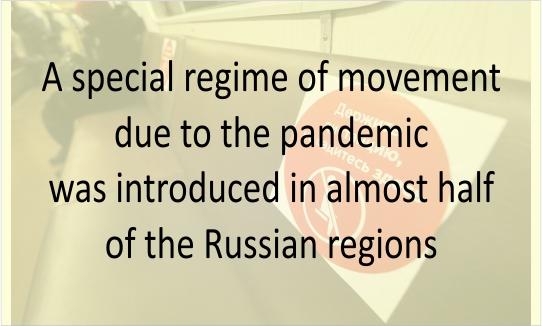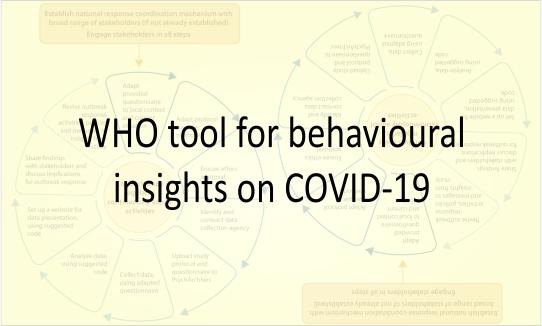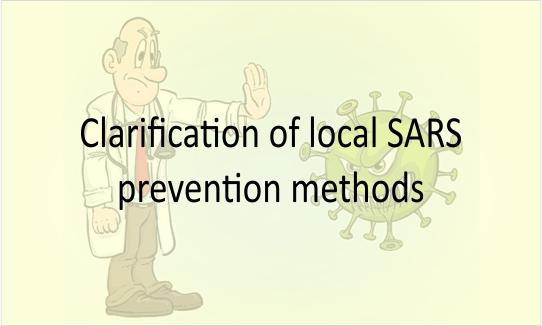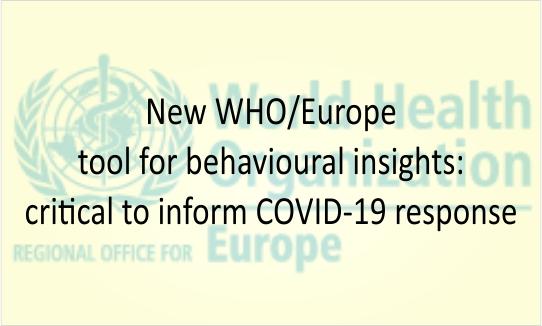A special regime of movement due to the pandemic was introduced in almost half of the Russian regions

Authorities of 39 from 85 regions of Russia by Friday evening introduced a special mode of movement due to the spread of a new coronavirus infection. Some of them limited entry to certain settlements, some revised the conditions of movement throughout the territory of the entire subject, follows from the statements of the regional authorities and the regulatory legal acts signed by them.
The self-isolation regime, mandatory or advisory, has been introduced in all regions of the Russian Federation. In most subjects, it applies to citizens of all ages, in some - only to certain groups, for example, persons over 65 years old. Cases of coronavirus infection have been identified in all regions of Russia.
Since April 17, the quarantine regime began to operate in Pyatigorsk (Stavropol Territory), where 31 cases of coronavirus infection were recorded. Only emergency vehicles and life support organizations will be able to enter the city. On Friday, quarantine was also introduced in several villages of Transbaikalia and one settlement of the Khabarovsk Territory, where foci of infection were identified. The authorities of Karelia announced a decision to install a checkpoint at the entrances from neighboring regions, as well as to close four cities with large industries - from next week only residents, workers and persons with special passes will be able to get into them.

Also, almost half of the constituent entities of the Russian Federation introduced certificates, route sheets or other mandatory documents for movement. Some regions went further and introduced a system of mandatory electronic passes - by Friday evening it is operating in Moscow and the Moscow region, Primorsky Territory, the Khanty-Mansiysk Autonomous Okrug (Khanty-Mansi Autonomous Okrug), Sevastopol, part of the Volga regions. The system of SMS passes from Friday also began to work in four cities of the Lipetsk region, where centers of infection are installed.
The regions are introducing other measures: for example, the authorities of Chukotka decided to limit passenger flights. Until April 30, only sanitary, postal and cargo flights will operate inside the district.
On March 29, Moscow Mayor Sergei Sobyanin and Moscow Region Governor Andrei Vorobyov expanded the high-alert regime. Within three days, almost all regions of Russia introduced similar restrictions.
The new measures provide for a regime of self-isolation for citizens of all ages, except when people need emergency medical care, purchase of products. However, in some of them, restrictions apply only to a certain part of the population, for example, for persons over 65 years of age and at risk groups. In part, subjects are quarantined by those who arrive from other regions of the country.
Read more
WHO tool for behavioural insights on COVID-19
WHO tool for behavioural insights on COVID-19 A WHO tool for rapid, flexible and cost-effective monitoring of public knowledge, risk perceptions, behaviours and trust is now available to countries in the WHO European Region to make their COVID-19-related response relevant and actionable. The outbreak is placing an overwhelming burden on health systems and authorities to respond with effective and appropriate interventions, policies and messages. One of the most critical elements of reducing virus transmission is public behaviour. For crisis response measures to affect public behaviours, they need to be perceived as consistent, competent, fair, objective, empathetic or sincere. They also need to be easily understood and communicated through trusted people and accessible channels. To succeed with this, it is critical to gain an understanding of issues such as: trust in health authorities, recommendations and information; risk perceptions; acceptance of recommended behaviour…
Recommendation for Prevention, Diagnosis and Treatment of New Infection
Clarification of local SARS prevention methods Temporary guidelines for the prevention, diagnosis and treatment of new coronavirus infection (COVID-19), published by the Ministry of Health of Russia, contain information on the possibility of using an isotonic solution of sodium chloride as a method for preventing infection with coronavirus infection. In connection with the appeals of the media, the Ministry of Health of Russia clarifies.When acute respiratory viral infections (ARVI) occur, as a rule, the mucous membrane of the nose and throat is affected. This is manifested in the form of nasal congestion, perturbation and sore throat and is called rhinitis and pharyngitis, respectively. Coronavirus infection refers to ARVI, so approaches to prevention and symptomatic…
New tool for behavioural insights: critical to inform COVID response
New WHO/Europe tool for behavioural insights: critical to inform COVID-19 response WHO/Europe has released a new behavioural insights tool for national and local authorities developing and coordinating interventions, policies and messages for the COVID-19 response. Understanding public levels of trust, people’s perceptions of risk, and the barriers they may face in following recommended actions is critical to the effectiveness and success of pandemic response measures. Such insights into public behaviour form the basis of effective…


